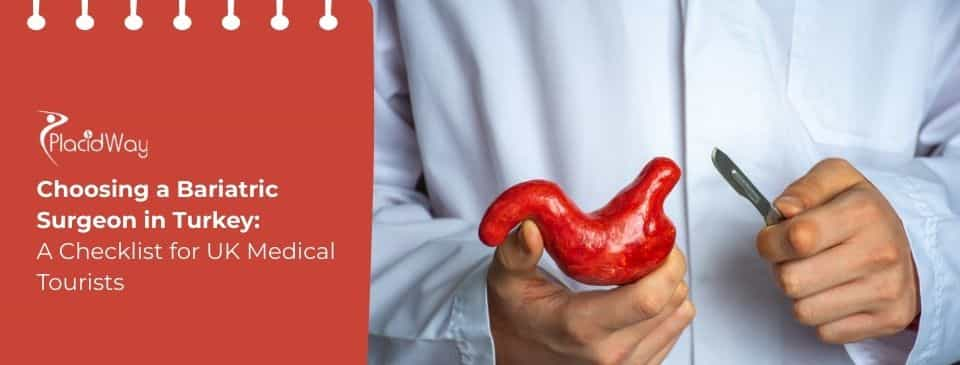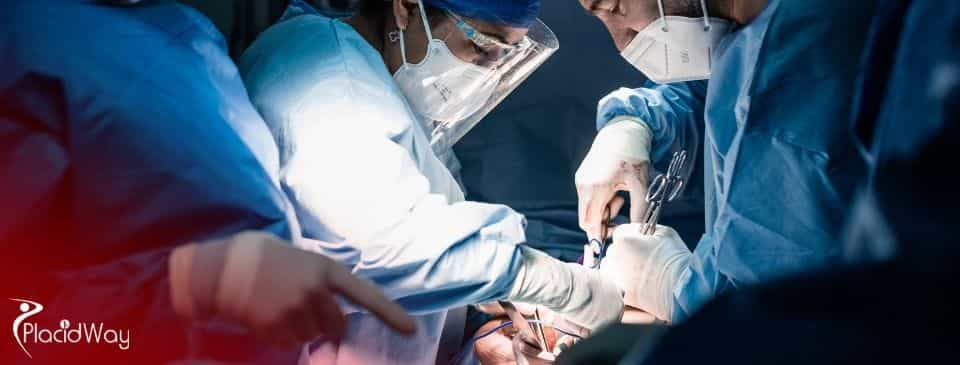
Turkey has rapidly become a global hub for medical tourism, particularly for UK patients seeking high-quality, affordable bariatric surgery. The combination of internationally accredited hospitals, highly experienced surgeons, and significant cost savings makes it an attractive option for those beginning their weight loss journey. However, choosing the right surgeon and clinic from afar can be a daunting task.
This comprehensive guide serves as your ultimate checklist, providing the essential steps and questions to ask to ensure you make a safe, informed, and confident decision. We will walk you through verifying credentials, understanding package inclusions, and preparing for your journey, empowering you to find the best bariatric surgeon in Turkey for your needs.
Key Takeaways
-
UK patients can save between 50-70% on weight loss surgery in Turkey compared to private UK prices, without compromising on quality or care standards.
-
The most crucial factors when selecting a surgeon are their board certifications, specific experience in bariatric procedures (number of surgeries performed), and the accreditation of the hospital (look for JCI or ISO).
-
All-inclusive packages are standard, but it's vital to confirm what is covered (e.g., post-op medications, aftercare support upon returning to the UK) and what is excluded (e.g., flights, treatment for unforeseen complications).
-
Bariatric Surgery Cost Comparison:
-
Gastric Sleeve Surgery: £2,500 - £4,500 in Turkey vs. £8,000 - £12,000 in the UK.
-
Gastric Bypass Surgery: £3,500 - £5,500 in Turkey vs. £10,000 - £15,000 in the UK.
-
Gastric Balloon (6-month): £1,500 - £2,500 in Turkey vs. £4,000 - £6,000 in the UK.
-
Why is Turkey a Top Destination for Bariatric Surgery?
Turkey's popularity stems from its unique blend of world-class medical infrastructure, highly skilled surgeons, and exceptionally competitive pricing. For UK patients, the geographical proximity and all-inclusive service models further enhance its appeal.
The Turkish government has heavily invested in its healthcare sector, leading to a surge in state-of-the-art hospitals equipped with the latest medical technology, such as Da Vinci robotic surgery systems. Many of these facilities in Istanbul, Izmir, and Antalya are JCI (Joint Commission International) accredited, the gold standard in global healthcare, ensuring they meet the same rigorous safety and quality protocols as top hospitals in the UK and USA.
Furthermore, Turkish bariatric surgeons often have extensive international training and experience, performing thousands of procedures like the gastric sleeve and gastric bypass annually. This high volume translates into a deep level of expertise and refined surgical techniques, which can lead to better outcomes and lower complication rates.
Your Ultimate Checklist: 10 Steps to Choosing the Right Bariatric Surgeon
A systematic approach is key to safely navigating your medical journey. This checklist breaks down the selection process into manageable steps, from verifying credentials to planning for aftercare.

1. Verify Surgeon Credentials and Experience
Confirm that your surgeon is board-certified by the Turkish Medical Association and has a sub-specialization in bariatric or metabolic surgery. Ask for specific numbers regarding their experience with your chosen procedure.
Your first and most critical step is to vet the surgeon’s qualifications. Don't be afraid to ask direct questions:
-
Are you a board-certified general surgeon with a fellowship in bariatric surgery?
-
How many gastric sleeve (or bypass) procedures have you performed in your career? How many in the last year? (A proficient surgeon typically performs hundreds per year).
-
Are you a member of any international bariatric surgery societies, like the International Federation for the Surgery of Obesity and Metabolic Disorders (IFSO)?
-
Can you share anonymized patient case studies or results?
Reputable surgeons will be transparent about their credentials and experience.
2. Assess Hospital and Clinic Accreditations
Prioritize surgeons who operate in internationally accredited hospitals, primarily those with JCI certification. This accreditation guarantees that the facility upholds the highest international standards for patient safety and care.
The quality of the hospital is just as important as the skill of the surgeon. JCI accreditation means the hospital has been thoroughly evaluated on everything from surgical safety protocols and infection control to staff qualifications and patient rights. You can verify a hospital's accreditation on the official JCI website. Also, check for ISO certifications and approval from the Turkish Ministry of Health.
3. Scrutinize Real Patient Reviews and Testimonials
Look for independent, third-party review platforms to get an unbiased view of patient experiences. A mix of reviews, including some that mention minor issues and how they were resolved, is often a sign of authenticity.
While clinics will showcase their best testimonials, you should dig deeper. Look for reviews on:
-
Trustpilot
-
Google Reviews
-
RealSelf
-
Specialized medical tourism forums and social media groups
Pay attention to comments about the surgeon's bedside manner, the attentiveness of the nursing staff, the cleanliness of the facility, and the quality of the post-operative support. Video testimonials and before-and-after photos can also be powerful indicators of a surgeon's results.
4. Understand the All-Inclusive Package Details
Request a detailed, itemized list of what the quoted price includes and, more importantly, what it excludes. This prevents unexpected costs and ensures you are comparing offers on a like-for-like basis.
A typical bariatric surgery package in Turkey should include:
-
The surgeon's and anesthesiologist's fees
-
All hospital costs for the duration of your stay
-
Pre-operative tests (blood work, endoscopy, ECG)
-
Hotel accommodation (usually 4-5 star) for a set number of nights
-
All airport, hotel, and hospital transfers with a private vehicle
-
A dedicated translator or English-speaking patient coordinator
-
Post-operative medications and a starter nutrition pack
Ask specifically about exclusions like flights, visa costs, and the protocol for managing potential complications.
5. Evaluate Communication and Language Support
Ensure you have a clear and direct line of communication with the surgeon or a dedicated medical team member, not just a sales agent. The ability to ask medical questions and receive clear answers in English is non-negotiable.
From your initial consultation (which should ideally be a video call with the surgeon) to your post-operative care, communication is key. A dedicated English-speaking patient host who stays with you during your hospital appointments is a sign of a high-quality service provider. This ensures nothing is lost in translation, especially when discussing informed consent and aftercare instructions.
6. Inquire About Comprehensive Aftercare
A crucial but often overlooked aspect is the long-term aftercare plan. Ask what support is provided once you return to the UK, such as virtual follow-ups, dietician access, and guidance for your local GP.
Bariatric surgery is a tool, not a cure. Long-term success is heavily dependent on robust aftercare. A top-tier Turkish clinic will provide:
-
A detailed diet plan progressing from liquids to solids.
-
Contact information for a nutritionist or dietician for at least 6-12 months post-op.
-
Scheduled virtual follow-up appointments with the surgical team.
-
A comprehensive medical report for you to share with your GP in the UK.
Expert Insight: "The success of bariatric surgery extends far beyond the operating room. We see the best long-term outcomes in patients who receive structured, long-term nutritional and psychological support. When choosing a provider abroad, UK patients must prioritize clinics that offer at least 12 months of remote follow-up. This continuous care is the bridge between a successful surgery and a lifelong transformation."
Comparing Bariatric Surgery Costs: Turkey vs. The UK
The primary driver for many UK patients is the significant cost savings available in Turkey. Patients can access the same or even superior quality of care for a fraction of the price of private surgery in the UK.
The cost difference is not due to a lower quality of care but is a result of Turkey's lower cost of living, operational expenses, and favorable exchange rates. This allows Turkish clinics to offer world-class medical services at a price point that is accessible to a much wider audience.
Here is a detailed breakdown of average costs:
Note: These are average prices. Costs can vary based on the surgeon's reputation, hospital choice, and package inclusions.
Understanding the Risks and Safety Measures
Like any major surgery, bariatric procedures carry inherent risks. However, choosing an experienced surgeon and an accredited hospital significantly mitigates these risks, making the procedure as safe as it would be in the UK.
Common surgical risks include infection, bleeding, blood clots, and adverse reactions to anesthesia. Procedure-specific risks for a gastric sleeve include staple line leaks, while gastric bypass patients can experience "dumping syndrome."
Top Turkish hospitals minimize these risks through:
-
Advanced Technology: Using high-quality surgical staplers and laparoscopic equipment reduces the risk of leaks and improves recovery time.
-
Rigorous Protocols: JCI-accredited hospitals follow strict pre- and post-operative safety checklists.
-
High Surgical Volume: Surgeons who perform a high number of procedures are better equipped to handle any potential complications that may arise.
Did You Know? According to the American Society for Metabolic and Bariatric Surgery (ASMBS), the overall mortality risk for bariatric surgery is approximately 0.1%, which is considerably lower than many other common operations, including gallbladder (0.7%) and hip replacement (0.93%) surgery.
Frequently Asked Questions (FAQ)
Is it safe to get bariatric surgery in Turkey? Y
Yes, it is very safe, provided you do your due diligence. By choosing a board-certified surgeon, a JCI-accredited hospital, and a reputable medical tourism facilitator like PlacidWay, you can ensure your safety and quality of care meet or exceed international standards.
How much weight can I lose with a gastric sleeve in Turkey?
Patients can typically expect to lose 60-70% of their excess body weight within the first 12 to 18 months after a gastric sleeve. Results vary based on adherence to the post-operative diet and exercise plan.
What is the best clinic for weight loss surgery in Turkey?
The "best" clinic is subjective and depends on your individual needs. The key is to look for objective markers of quality: JCI accreditation, a highly experienced surgeon with verifiable credentials, and overwhelmingly positive independent patient reviews. PlacidWay can help you connect with several pre-vetted, top-tier clinics.
What happens if there are complications after I return to the UK?
This is a critical question. Your chosen clinic should provide a clear protocol for this scenario. It usually involves immediate contact with their surgical team for remote guidance. For emergencies, you would need to visit an A&E in the UK. Some clinics partner with insurance companies that offer policies specifically covering complications from medical tourism.
How long do I need to stay in Turkey for a gastric sleeve?
The typical medical trip lasts for 7-10 days. This includes 1-2 days for pre-operative tests, the day of surgery, a 2-3 night stay in the hospital for monitoring, and a few additional days of recovery in a hotel before you are cleared to fly home.
Can my local GP provide aftercare after surgery in Turkey?
Your GP can provide general support, but they are not specialists in bariatric aftercare. You should not rely solely on your GP. It is essential that your Turkish clinic provides a robust remote aftercare program with dietician support. The medical report from your Turkish surgeon will be crucial for your GP to have on file.
Ready to Find Your Surgeon? Let PlacidWay Guide You.
Choosing a bariatric surgeon is a life-changing decision. At PlacidWay, we simplify the process by connecting you with a network of Turkey's most reputable bariatric surgeon, pre-vetted bariatric surgeons and JCI-accredited hospitals. We provide transparent pricing, verified patient reviews, and end-to-end support to ensure your journey is safe, seamless, and successful.

.jpg)






-(1).png)
.png)








Share this listing